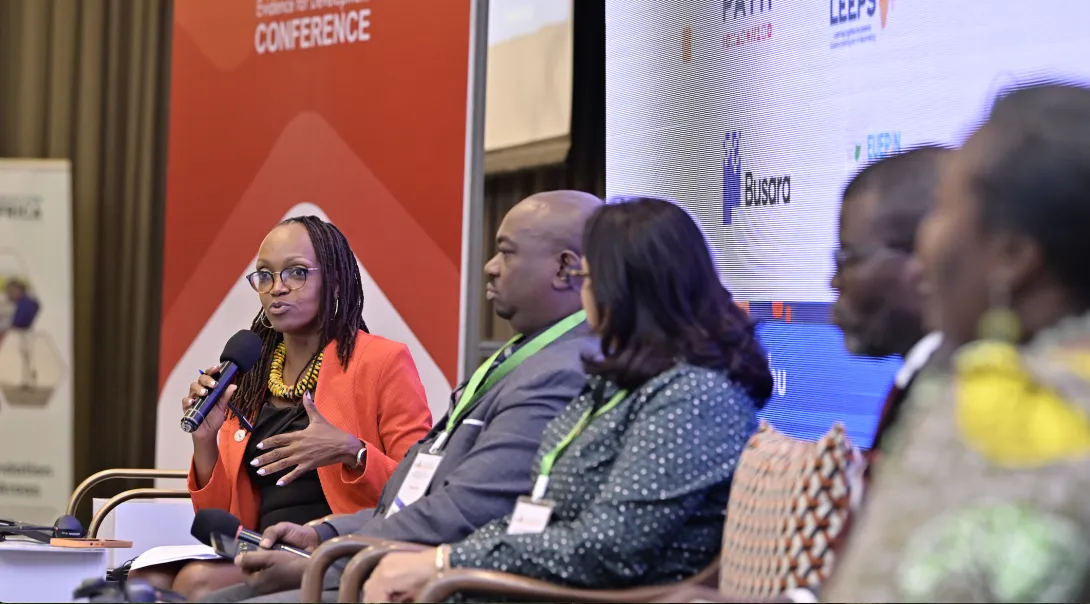
By Derick Ngaira and Adaudo Anyiam-Osigwe
Africa needs to increase investments in research, education, and knowledge systems to realise its development agenda. This was the resounding message on the first day of the Evidence for Development (Evi4Dev) Conference in Nairobi under the theme: “Generation and Translation of Scientific Research and Innovations for the Realisation of Agenda 2063.”
Opening ceremony
Delivering remarks on behalf of Kenya’s Cabinet Secretary for Education, Dr Rosalinda Awuor, Director of Research and Development, emphasised that inadequate investments in research, poor data quality, and weak uptake of evidence in policymaking remain key barriers to achieving inclusive development. She reaffirmed Kenya’s commitment to strengthening science and education systems in line with the African Union’s Science, Technology and Innovation Strategy for Africa (STISA) and Agenda 2063.
Hon. Dr Jessie Kabwila, Malawi’s Minister for Higher Education, underscored the urgent need to scale up investments in Africa’s knowledge ecosystem, “however, producing evidence alone is not enough.” she stated. We must also ensure it is effectively disseminated and routinely used in all decision-making processes. To achieve this, there is an urgent need to strengthen relationships between researchers and policymakers,” she added.
Prof. Brando Okolo, Senior Advisor, Science Technology and Innovation at the African Union Development Agency (AUDA-NEPAD), highlighted the significance of the conference in promoting the use of evidence across Africa. “This conference challenges us not only to reflect on evidence use but to ensure that data is collected with purpose, applied to just causes, and that innovations are deployed effectively and appropriately,” he stated.
Dr Eliya Zulu, Executive Director of African Institute for Development Policy (AFIDEP), urged stakeholders to increase investment in research amidst a decline in donor funding. “As ODA declines, funding for research will also be affected – and we need to advocate for increased funding of research and development – let's get the 2 % expenditure,” he stated.
Giving a keynote address, Dr Tom Kariuki, Chief Executive Officer (CEO) of the Science for Africa (SFA) Foundation, noted that by deploying evidence and technology in key sectors like wealth creation, education, healthcare and infrastructure, would go a long way in achieving sustainable development.
Plenary: High-Level Panel on Integrating STISA 2034 into National Development Agendas
The Science, Technology, and Innovation Strategy for Africa 2034 (STISA 2034) developed and implemented by the African Union aims to transform the continent into a knowledge-based economy, leveraging science, technology, and innovation (STI) for Africa’s socioeconomic transformation. The plenary examined how this can be achieved, focusing on how national governments can fully understand the strategy, and apply it to their own contexts for locally driven innovation across the continent. Panellists emphasised the need for leadership in all different countries to be more proactive in enabling institutions and agencies to own the STISA 2034 agenda.
The plenary was moderated by Dr Eliya Zulu, featuring as panellists: Hon. Dr Jessie Kabwila, Minister of Higher Education, Malawi; Hon. Aziz Sarjoh Kamara, Deputy Minister of Technical and Higher Education – Sierra Leone; Mr. Patrick Mugisha, Commissioner, Business Development and Quality Assurance - Ministry of Trade, Industry and Cooperatives Uganda; and Prof. Brando Okolo.
Plenary: Science leadership: Bridging the gap between science and policy
The plenary explored how African governments can better institutionalise science leadership to ensure that evidence is consistently used to inform public policies. Discussions highlighted the importance of building trust between researchers and decision-makers, creating enabling environments for evidence uptake, and building research capacities.
Panellists called for policy engagement to be formally recognised and rewarded within research institutions, and for African scientists to actively shape the policy agenda by communicating their findings more effectively.
The session, moderated by Dr Evelyn Gitau of the SFA Foundation , brought together a distinguished panel of scientists and policy experts including Abdoulaye Diabete, Principal Investigator at Target Malaria in Burkina Faso; Thumbi Mwangi, Co-director of CEMA at the University of Nairobi; Prof. Richard Okoth Odour, a Professor of Molecular Biology at Kenyatta University; Prof. Tatien Masharabu of the East African Science & Technology Commission (EASTECO); Prof. Ikram Guizani, Director of the African Leishmaniases Consortium (ALC) at Institut Pasteur de Tunis; and Dr. Naa Dodoo, Senior Research and Policy Analyst at AFIDEP.
Plenary: Harnessing AI and digital innovations to accelerate Agenda 2063 progress
The plenary session on harnessing artificial intelligence (AI) and digital innovations focused on how Africa can leverage cutting-edge technologies to fast-track the goals of Agenda 2063. Panellists explored the wide-ranging benefits of AI and data science across critical sectors such as healthcare, agriculture, education, and climate resilience. These technologies, they argued, present an opportunity to leapfrog development, increase access to quality services, and create new pathways for inclusive economic growth.
The panelists emphasised the need for Africa to build its own digital future through deliberate investments in local innovation, human capital, and digital infrastructure. The discussion underscored that Africa must not only adopt global technologies but also develop homegrown solutions that reflect the continent’s unique needs and contexts.
The plenary session, moderated by Dr. Barbara Glover from the African Union Development Agency (AUDA-NEPAD), featured a diverse panel of technology and innovation leaders including Matthew Grollnek, Lead for Employability and the Future of Work at Mastercard Foundation; Fargani Tambeayuk, Director of Public Policy for Francophone Sub-Saharan Africa and Head of the Innovation and Connectivity Cluster at Meta; Abdelaziz Saidu, Senior Engineer at Cisco Africa; Shikoh Gitau, CEO and Founder of Qhala; and Wanjiku Jean Munyaka, Partner Development Manager at Microsoft Tech.
Conclusion
The opening day of Evi4Dev Conference concluded with renewed calls for Africa to take charge of its development agenda through bold investment in scientific research, institutional capacity, and homegrown innovations. The continent’s future, speakers agreed, lies in building resilient systems that are informed by evidence and designed with the African context in mind.
Watch the highlights here: https://www.youtube.com/watch?v=-1H0ZajOojc

